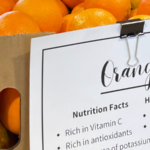
- BlogThe best way to support your health as you age...Did you know that someone can be food secure and...4 Minute ReadThe Future of Arkansas is Food as MedicineWell...The heart is one of the most important organs in...Children who eat poorly are more likely to develop certain...
Need help?
We are here to serve you, contact us, we will get back to you as soon is possible. - About us
- Programs
Education
We believe nutrition education is vital to empowering families forwards in their health journey.
Food Box Distribution
We offer the same fresh and FREE healthy foods carefully packed in boxes for delivery to families.
Mobile Pop-up Market
Our Mobile Market offers participants a FREE “client choice” pick your fresh vegetables.
Produce Prescription Programs
Produce Prescription programs strategically combat diet-related illness with food intervention.
- Get involved
- Contact Us



































